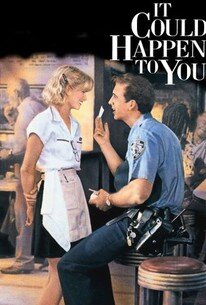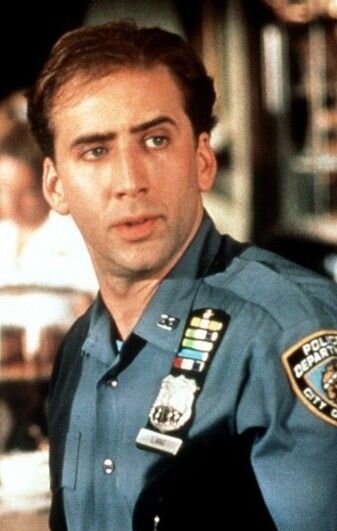The Travolta/Cage Project #40 It Could Happen To You (1994)
The turmoil and tragedies of 2020 have reshaped the world and the way we see ourselves in some radical, profound and possibly permanent ways. It’s forced us to take a step back, for example, and think long and hard about the role law enforcement plays in both society and pop culture.
The murder of George Floyd and far too many state-sanctioned killings like it have forced us to examine our knee-jerk deification of cops in movies and television shows. The rise of ACAB, or the increasingly popular notion that All Cops Are Bastards, less a matter of a few bad apples spoiling the bunch than policing being a hopelessly corrupt profession that is rotten to the core, has forced us to re-examine ubiquitous, popular and powerful genres built upon the conviction that all police are good, and that even if they break the rules, it’s overwhelmingly in the interest of the public good.
When It Could Happen to You was released to largely positive reviews and solid box-office in 1994, I doubt anyone saw anything even remotely political, let alone problematic, in the crowd-pleasing, populist story of a saintly, kind-hearted white, straight New York hero cop (Nicolas Cage) beloved by all getting dumped by his evil, greedy and superstitious Hispanic wife (Rosie Perez) and finding comfort in an equally kind, big-hearted white waitress (Bridget Fonda) he split a winning lottery ticket with in lieu of a tip, a fairy tale romance documented for posterity in New York Post, which is depicted as the newspaper of the common man.
It Could Happen to You was billed as being based on a true story. Indeed, the film’s wise narrator Angel Dupree (Isaac Hayes), who, like all good-hearted people who care about humanity, writes for The New York Post, tells us early on that what we’re about to see actually happened pretty much the way depicted.
In actuality, It Could Happen to You took the core of a real-life story about a cop who split a winning lottery ticket with a waitress in lieu of a tip and discarded everything that did not suit its narrative.
It takes nothing away from It Could Happen to You to say that it’s a nice movie you can watch with your grandma, just like Guarding Tess and Honeymoon in Vegas, with which it shares a star (Cage), a director (Andrew Bergman) and an eagerness to please the broadest, widest, whitest possible audience.
How ingratiatingly old-fashioned is It Could Happen to You? Even though it takes place in the present, our lovable cop protagonist Charlie Lang (Nicolas Cage) plays stickball in the street with some Dead End Kids like he was in a 1930s Warner Brothers melodrama.
Stickball! The unofficial official sport of real New Yorkers who can’t afford a fancy bat and have to make do with a modified broom. If It Could Happen To You were any more self-consciously retro, the movie’s romantic leads would encounter street corner doo-wop groups or breakdancing battles everywhere they went.
Hayes’ big-hearted New York Post scribe begins the film by describing what a kitten-rescuing, baby-delivering, non-corrupt mensch Charlie Lang is. “He was just a good cop!” Angel insists, an early, clear-cut indication that It Could Happen to You’s approach to law enforcement will be less ACAB than “aren’t cops great? They protect and serve, but they’re lovely human beings as well.”
Charlie’s innate goodness is causing all manner of problems with his marriage to sinister succubus Muriel (Rosie Perez). Charlie and Muriel have profound differences. Charlie is an angel. Muriel is the devil. Charlie is good. Muriel is bad. Charlie wants to make the world a better place. Muriel just wants money.
Charlie’s honesty pretty much ensures that he’ll never be able to give Muriel the life of luxury that she angrily demands but she has him buy lottery tickets in order to keep her dream of massive, unearned wealth alive.
At a diner one night Charlie does not have enough money in his wallet, so he tells hard-luck waitress Yvonne Biasi (Bridget Fonda) that her tip is half of a lottery ticket, and if it wins he’ll come back and split the winnings with her.
It’s a testament to what an improbably, impossibly nice guy Charlie is that when people offer to give him things for free because he’s a cop he seems embarrassed and uncomfortable, whereas every other cop in the history of the universe, fictional or otherwise, has welcomed getting free stuff as the universe’s way of compensating them for a job where they could get killed.
Though It Could Happen to You is a spun-sugar New York fairy tale in many ways, it has a nice eye for some of the harsher realities of working-class life. When we meet Yvonne (Bridget Fonda) for the first time, for example, she is in court successfully filing for bankruptcy after her loser actor ex-husband rang up 12,000 dollars in credit card debt.
In 1994 that was apparently very bad. In 2020 it’s actually pretty good. I WISH I only had twelve thousand dollars in credit card debt. I would be living the dream. The scrappy waitress’ fortunes take a dramatic turn for the better when Charlie agrees to share half of a winning lottery ticket with her, much to his gold digging wife’s chagrin.
Becoming a millionaire after a life of struggling and just scraping by isn’t enough for Muriel, the Cruella de Vil of Queens. This greedy schemer doesn’t see winning millions as a wholly unearned happy ending for a life of greed and selfishness, but rather a beginning.
Muriel is particularly upset when her painfully honest husband offers to make good on his promise to the waitress and give her two million dollars she could be using to buy solid gold swimming pools and chinchilla toilet paper for herself.
The contrast between Muriel and Yvonne could not be more pronounced. Yvonne is an adorable underdog who radiates unbridled excitement and appreciation when a man she will soon come to love gives her the life-changing news that she has just made the extraordinary leap from bankrupt service worker to multi-millionaire. Muriel is the anti-Christ.
Yvonne and Charlie, being unusually good, as well as unusually attractive human beings, want to use their massive windfall for good, to help people. Muriel uses it for evil, to hurt people.
Cage and Fonda have terrific chemistry as paragons of decency and kindness who have suffered needlessly at the hands of an unkind world and cruel, half-mad God before finding something good and kind and lasting in each other.
Cast against type as a salt of the earth working class everyman, Cage makes normality and light as compelling as insanity and darkness in his more colorful character actor performances.
Cage could easily have enjoyed a career as a romantic leading man. He had the looks. He had the charm. He had the magnetism and comic timing. In It Could Happen to You, at least, he has a suspiciously full head of hair. But he chose a different, infinitely more challenging and rewarding path, which makes It Could Happen to You a fascinating glimpse into a road Cage ultimately did not travel down.
It Could Happen to You is on solid ground when dealing with the charming and tender working class romance at its core. But when Muriel divorces Charlie and sets her sights on Yvonne’s half of the lottery winnings the movie makes a shift into courtroom drama every bit as unwelcome and counter-productive as Guarding Tess’ weird devolution into a second-rate action thriller.
Andrew Bergman’s quintessentially nice movie benefits tremendously from savvy casting. There’s not much to the role of the big-talking financial huckster who fleeces Muriel but casting Seymour Cassel in the role automatically lends it a vividness and specificity lacking on the page.
Stanley Tucci is similarly brilliant casting in the under-written role of Yvonne’s sleazy ex and Richard Jenkins livens up some of the film’s worst scenes as Muriel’s pit-bull of a lawyer, who is every bit as vicious and uncompromising as his client.
Like Guarding Tess before it, It Could Happen To You is perfectly fine. For a Nicolas Cage vehicle it is downright perverse in its normality but not without its charm. Like Guarding Tess and Honeymoon in Vegas I remember renting it out a lot as a video store clerk, which seems appropriate, as this is totally the kind of perfectly acceptable movie you catch on video eventually instead of racing out to the theater to see.
Help ensure a future for the Happy Place during an uncertain era AND get sweet merch by pledging to the site’s Patreon account at https://www.patreon.com/nathanrabinshappyplace
Also, BUY the RIDICULOUSLY SELF-INDULGENT, ILL-ADVISED VANITY EDITION of THE WEIRD ACCORDION TO AL, the Happy Place’s first book. This 500 page extended edition features an introduction from Al himself (who I co-wrote 2012’s Weird Al: The Book with), who also copy-edited and fact-checked, as well as over 80 illustrations from Felipe Sobreiro on entries covering every facet of Al’s career, including his complete discography, The Compleat Al, UHF, the 2018 tour that gives the book its subtitle and EVERY episode of The Weird Al Show and Al’s season as the band-leader on Comedy Bang! Bang!
Only 23 dollars signed, tax and shipping included, at the https://www.nathanrabin.com/shop or for more, unsigned, from Amazon here








